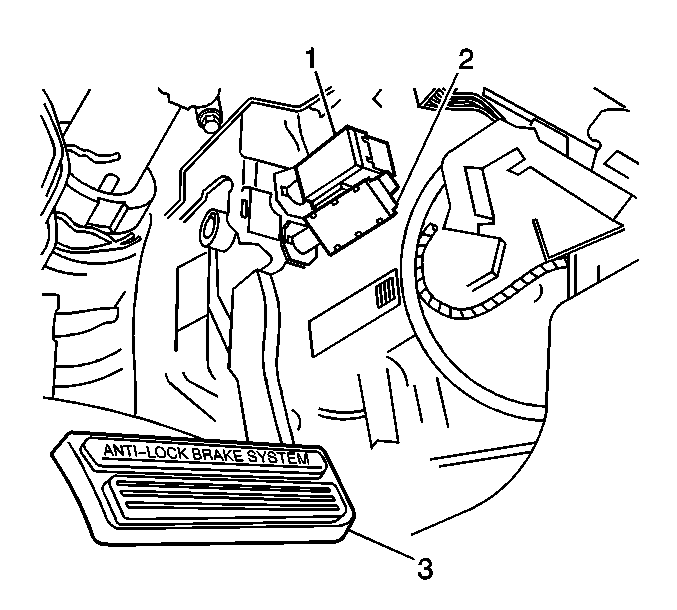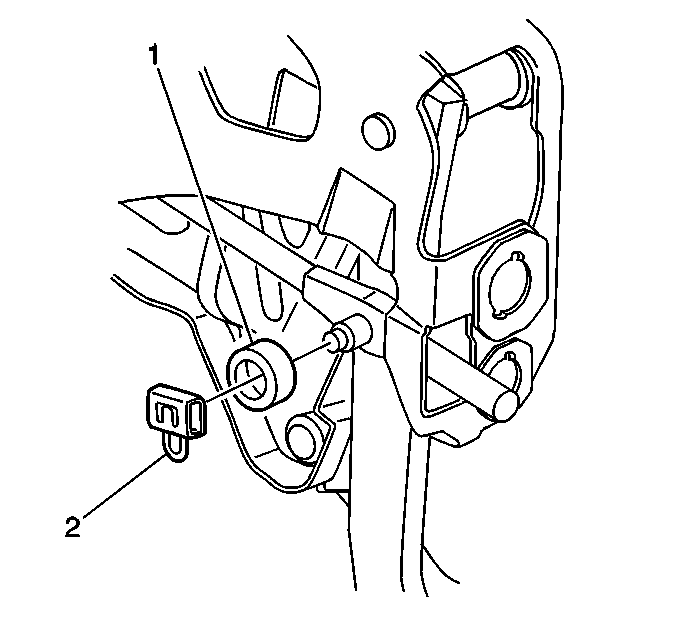Brake Pedal Assembly Replacement LHD
Removal Procedure
- Remove the IP assembly. Refer to Instrument Cluster Replacement in Instrument Panel, Gages and Console.
- Disconnect the electrical connectors from the stoplamp/ABS/shift lock switch (2).
- Disconnect the electrical connectors from the TCC/cruise control release switch (1).
- Remove the stoplamp/ABS/shift lock switch (2). Refer to Stop Lamp Switch Replacement .
- Remove the TCC/cruise control release switch (1).
- Disconnect the accelerator cable from the brake pedal assembly. Refer to Accelerator Control Cable Replacement in Engine Controls - 4.6L.
- Remove the brake pedal pushrod retainer (2) from the brake pedal clevis pin.
- Remove the foam spacer (1) from the brake pedal clevis pin.
- Remove the brake pedal pushrod from the brake pedal clevis pin.
- Remove the brake pedal nuts from the cowl (1).
- Remove the brake pedal nuts from the booster studs (2, 3).
- Remove the brake pedal assembly.



Installation Procedure
- Install the brake pedal assembly onto the booster studs.
- Install the booster stud nuts (2, 3).
- Install the brake pedal nuts onto the cowl studs (1).
- Apply a small amount of lubricant, GM P/N 9985164 or equivalent, to brake pedal clevis pin.
- Install the vacuum booster pushrod to the brake pedal clevis pin.
- Install the foam spacer (1) to the brake pedal clevis pin.
- Install the brake pedal pushrod retainer clip (2) to the brake pedal clevis pin.
- Connect the electrical connectors to the stoplamp/ABS/shift lock switch (2).
- Connect the electrical connectors to the TCC/cruise control release switch (1).
- Install the brake stoplamp/ABS/shift lock switch (2). Refer to Stop Lamp Switch Replacement .
- Install the TCC/cruise control release switch (1).
- Connect the accelerator cable to the brake pedal assembly. Refer to Accelerator Control Cable Replacement in Engine Controls - 4.6L.
- Install the IP assembly. Refer to Instrument Cluster Replacement in Instrument Panel, Gages and Console.

Notice: Use the correct fastener in the correct location. Replacement fasteners must be the correct part number for that application. Fasteners requiring replacement or fasteners requiring the use of thread locking compound or sealant are identified in the service procedure. Do not use paints, lubricants, or corrosion inhibitors on fasteners or fastener joint surfaces unless specified. These coatings affect fastener torque and joint clamping force and may damage the fastener. Use the correct tightening sequence and specifications when installing fasteners in order to avoid damage to parts and systems.
Tighten
Tighten the brake pedal to booster stud nuts to 23 N·m
(17 lb ft).
Tighten
Tighten the cowl stud fasteners to 16 N·m (12 lb ft).


Brake Pedal Assembly Replacement RHD
Removal Procedure
- To access the brake pedal assembly to cowl mounting nuts, remove the I/P assembly. Refer to Instrument Cluster Replacement in Instrument Panel Gages and Console.
- Disconnect the electrical connector from the stoplamp/ABS/shift lock switch (2).
- Remove the stoplamp/ABS/shift lock switch (2). Refer to Stop Lamp Switch Replacement .
- Disconnect the electrical connector from the TCC/cruise control release switch (1).
- Remove the TCC/cruise control release switch (1).
- Remove the vacuum brake booster pushrod retainer (2) from the brake pedal clevis pin.
- Remove the foam spacer (1) from the brake pedal clevis pin.
- Remove the vacuum brake booster pushrod from the brake pedal clevis pin.
- Remove the brake pedal assembly mounting nuts from the cowl stud.
- Remove the brake pedal assembly mounting nuts from the booster studs.
- Remove the brake pedal assembly.



Installation Procedure
- Install the brake pedal assembly onto the booster and cowl studs.
- Install the brake pedal assembly to brake booster mounting nuts.
- Install the brake pedal assembly to cowl mounting nuts.
- Apply a small amount of lubricant, GM P/N 12346293 or equivalent, to the clevis pin of the brake pedal.
- Connect the vacuum brake booster pushrod to the brake pedal clevis pin.
- Install the foam spacer (1) to the brake pedal clevis pin.
- Install the retainer clip (2) to the brake pedal clevis pin.
- Install the brake stoplamp/ABS/shift lock switch (2). Refer to Stop Lamp Switch Replacement .
- Connect the electrical connector to the stoplamp/ABS/shift lock switch (2).
- Install the TCC/cruise control release switch (1).
- Connect the electrical connector to the TCC/cruise control release switch (1).
- Install the I/P assembly. Refer to Instrument Cluster Replacement in Instrument Panel, Gauges and Console.

Notice: Use the correct fastener in the correct location. Replacement fasteners must be the correct part number for that application. Fasteners requiring replacement or fasteners requiring the use of thread locking compound or sealant are identified in the service procedure. Do not use paints, lubricants, or corrosion inhibitors on fasteners or fastener joint surfaces unless specified. These coatings affect fastener torque and joint clamping force and may damage the fastener. Use the correct tightening sequence and specifications when installing fasteners in order to avoid damage to parts and systems.
Tighten
Tighten the brake pedal assembly to booster stud mounting nuts to 23 N·m (17 lb ft).
Tighten
Tighten the brake pedal to cowl mounting nuts to 16 N·m (12 lb ft).


